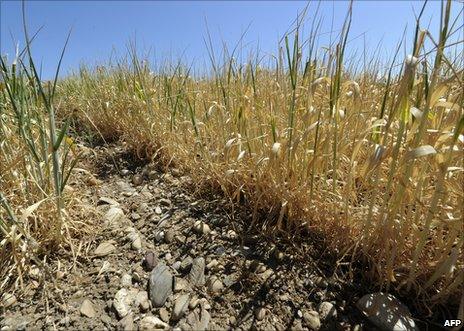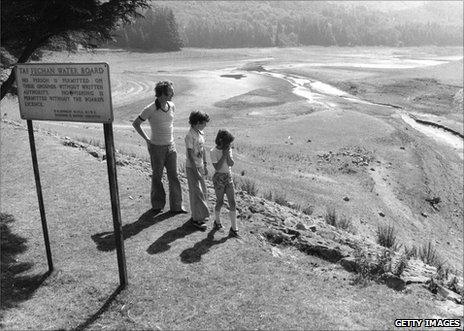Northern Europe's farmers fear drought as bad as 1976
- Published
- comments

French wheatfields, like this one near Lyon, are parched
Farmers in northern Europe are finding themselves caught between a hard place and a rock-hard place as an unusually dry spring turns to summer.
France, the EU's top wheat producer, has formed a national "drought committee", limiting water consumption in many regions and lifting curbs on the use of fallow land for grazing.
The European Commission has just approved in principle France's request for an advance on the Common Agricultural Policy (CAP) payments its farmers are due to receive in December, bringing them forward to 16 October.
With parts of Europe seeing less than 40% of their long-term average rainfall between February and April, fellow EU states may follow suit.
A bad year for wheat - second only to wine as the EU's largest agricultural product - would hurt not only the farmer, but could well hit the consumer, driving up the cost of Europeans' pasta and pretzels.
"You see the root, how it's dry, how short it is?" asked rapeseed grower Pascal Seingier this week, speaking to a Reuters TV crew that came to see him on his farm near Lumigny in northern France.
"There is nothing. And the whole top of the field is like that. Fortunately that's not the case lower down. But where the earth is very shallow, where there are no water reserves, well - there you go."
'No real rain'
Cracked earth and browned leaves are visible across the Ile-de-France region, according to Reuters.
On a family farm in another part of the region, l'Essonne, Nicolas Dufour and his father Jean-Marc have also been struggling to grow rapeseed as well as wheat and barley.
"We began to get concerned at the beginning of April after seeing March go by without any real rain," the son told France's Le Monde newspaper this month.
"There were some storms actually but the ground was too dry to benefit from them."
On the farm, they have stopped believing in rain, Nicolas said. "Each time a shower looks like coming on, the weather turns and there isn't a drop."
Ironically, Jean-Marc acquired the farm in 1976, the year of northern Europe's great drought, which he managed to survive with the aid of a loan and "a lot of elbow grease".
"When you're young and full of ambition, you tighten your belt and hang on in there," he recalled.
According to French Agriculture Minister Bruno Le Maire, the dry spell may hurt livestock farmers just as hard, as they face both a shortage of feed and rising feed prices.
And France's neighbours are having their own share of the pain:
Farmers in the south-west German region of Rhineland-Palatinate were fearing "serious financial losses" from crop failure and mounting irrigation costs, the country's Deutsche Welle website wrote earlier this month., external
In the English county of Hertfordshire, cereals sown this spring have been practically wiped out, according to a Daily Telegraph report this week, external
France's agriculture minister declared a "significant victory" in his request for early CAP payments, while admitting he might have to ask Brussels for more emergency aid eventually.
But one official close to the European Commission was "very surprised" to hear the minister talking of a victory so long before the advance payments could be made.
Grain of comfort
Asked by BBC News Online whether the EU was facing one of its worst drought crises, the official replied it was "far too early to say".
Grain farmers can take some comfort in better prices for their produce due to high demand for EU produce after last year's crop failures in Russia and the flooding in Australia.
A warm spring has also been a boon to some fruit farmers, such as strawberry growers in the English county of Nottinghamshire, who saw their earliest crop in living memory.
But for others, the worrying thing is that this year's dry spell started early, as it did in 1976 for Jean-Marc Dufour and his generation.

The Taf Fechan reservoir in Wales was almost dry during the 1976 drought
The disastrous drought that year culminated in a heatwave during which England, for example, saw a sustained period of temperatures above 30C. Could this happen again in 2011?
The UK's Met Office avoid issuing long-term predictions, saying the public do not find them useful.
However, Meteo France is predicting above-average temperatures for that country from May to July, a pattern predicted by others across northern Europe.
"There is a good chance of temperatures significantly above normal this summer in Europe," one UK-based weather forecaster told BBC News Online.
"But 1976 was so exceptional, I wouldn't be making any parallels at the moment."
Even if the spectre of '76 recedes, much damage has already been done.
France's soft wheat output is forecast to fall by 11.5% this year compared with last, as a direct consequence of the lack of rain over the past three months, while in Germany the wheat harvest is now expected to be down 7.2% on last year.
"As time goes by the impact on crops grows stronger," a European grain trader told Reuters. "We need water, period."
- Published1 July 2013
- Published18 November 2010